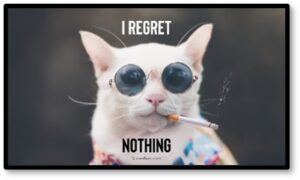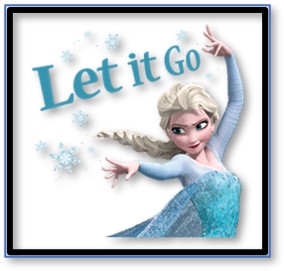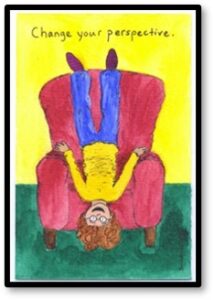Monday Author: Susanne Skinner
As we enter our eighth month of virus-imposed isolation, I confess there aren’t as many distractions to keep me from contemplating things that might have been.
Would-haves, Could-haves, Should-haves
 The would-haves, the could-haves, and the should-haves. Every now and then I look at them and wonder what if. I wouldn’t change things (well, maybe one or two) because I am happy with the person I am today. Looking back shows me the sum of choices made across six decades of living, including the almosts and the could haves.
The would-haves, the could-haves, and the should-haves. Every now and then I look at them and wonder what if. I wouldn’t change things (well, maybe one or two) because I am happy with the person I am today. Looking back shows me the sum of choices made across six decades of living, including the almosts and the could haves.
I’m mostly a forward-looking woman. I embrace the paths that shaped my life; but once in a while I look back, because it’s human nature. Hopes and dreams make up everyone’s journey. Those that did not end the way we planned beg the question of the road not taken and how it might have changed things.
Do-Overs
The truth about do-overs is that there aren’t any. Perhaps it is the expression I don’t like. Everyone deserves a second chance, but we can’t turn back the clock, un-speak the words, or erase something that already happened. We can try it again, offer an apology, or even pretend it didn’t happen, but we can’t undo it.
It’s a start-over rather than a do-over. I know it sounds trite, but if a misstep teaches a lesson, we’re unlikely to repeat it. Life is messy; mistakes are made. Looking back maintains perspective on how far we’ve come, sometimes with gratitude for unanswered prayers.
Everyone’s behavior is changeable (it’s personality that’s set in concrete). People make fresh starts and re-invent themselves all the time. If we didn’t look back once in a while, we’d forget just how many times we’ve started over.
Therein lies the benefit of examining one’s journey on a regular basis.
Je Ne Regrette Rien
If only that were true. Regrets are part of the package: words not spoken, a chance not taken, the it-seemed-like-a-good-idea-at-the-time decision. Everyone has something they wish had turned out differently—everyone.
 Regret is the second-most common emotion people mention and it’s the most common negative emotion. Because it’s thinking and feeling reaction, it is often associated with fault or blame and inaction rather that action.
Regret is the second-most common emotion people mention and it’s the most common negative emotion. Because it’s thinking and feeling reaction, it is often associated with fault or blame and inaction rather that action.
When it comes to regrets, our past is here to guide us. It shows us a foot put wrong and offers a gentle reminder of our blessings. Regrets are life lessons; knowledge we gain from a failure to learn the first time around. Who hasn’t been there and done that?
Regret sounds and feels negative but it is often the emotion that inspires us to grow and change.
Lessons Learned
Learn the lesson and move on. The value of wondering what could have been should never detract from living in the present. Let the past serve as a reminder—a celebration of accomplishments and good choices. As for bad choices, recognize them for what they are, then commit to a better outcome with new information.
The past is a guide that invites us to change what didn’t work right the first time, but it is not a place to dwell. A healthy approach looks for ownership rather than blame. One of my mom’s favorite reminders: a finger pointing at someone else means there are three fingers pointing back at you—is one of my truths.
The best use of regret is as a data point in your personal self-improvement program.
Let Go of the Past
For all sad words of tongue and pen, the saddest are these, “It might have been.”
~ John Greenleaf Whittier
Give yourself the freedom to let go of what weighs you down. Some things are not meant for you. By walking away from people, places and things that create negative energy you have room to heal, grown, forgive and move on.
 Letting go is a hard lesson. Perhaps it gets easier with age. I certainly could not do it in my twenties or thirties. I come from a long line of grudge holders and none of us made it to the anger management workshop.
Letting go is a hard lesson. Perhaps it gets easier with age. I certainly could not do it in my twenties or thirties. I come from a long line of grudge holders and none of us made it to the anger management workshop.
In fact, nobody overstates a wrong or magnifies a slight quite the way my family does—it’s in our DNA to react first and process later. I had to unlearn that model and, fortunately, the real world is a good teacher.
Another of Mom’s favorite sayings: “With age comes wisdom, but sometimes age comes alone.”
It’s All About Perspective
 Change your perspective, change your reality. When you can’t control the situation, look for ways to control the circumstances. If that is not possible, sit for a while with poet Henry Wadsworth Longfellow’s advice: “The best thing one can do when it’s raining is to let it rain.”
Change your perspective, change your reality. When you can’t control the situation, look for ways to control the circumstances. If that is not possible, sit for a while with poet Henry Wadsworth Longfellow’s advice: “The best thing one can do when it’s raining is to let it rain.”
How we see the world is up to us; our actions and reactions become the truth we live. Not everything works out the way we hope. Focusing on what we didn’t get prevents the good stuff from getting in. Eventually we cease to believe we deserve it.
Like Marlon Brando’s character Terry Malloy, all that is left is what coulda been.
